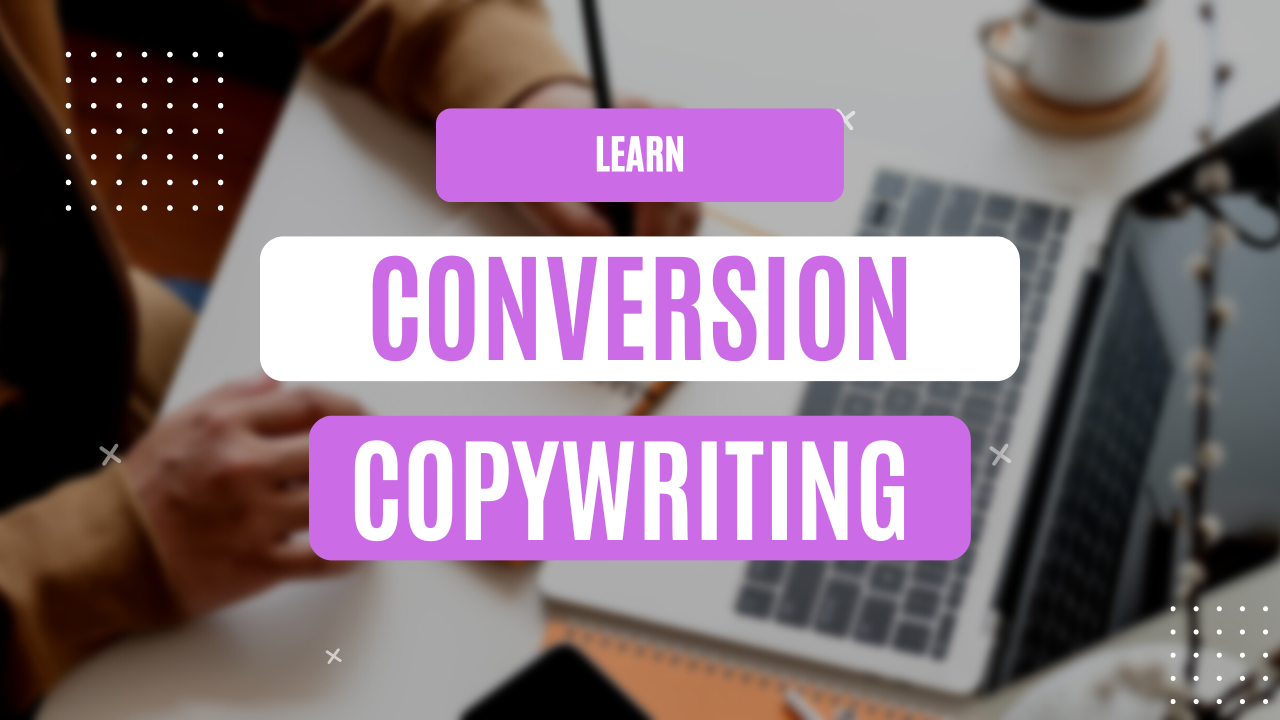Conversion copywriting is a skill worth developing and it’ll pay dividends across all areas of your life. I
Here’s why it’s worth setting a professional goal around it improving your conversion copywriting skills.
I use conversion copywriting all the time both in my day job as a growth marketer helping billion-dollar companies like Loom grow and as I build this blog into a $20k/month income source.
I bet you’ve used conversion copywriting without even knowing it.
Need to convince your boss to say yes to a project over Slack? That’s conversion copywriting.
Need to edit website or ad copy to improve performance? That’s conversion copywriting.
In this post I’ll explain what conversion copywriting is, why it matters, and how you can use it.
And if you want to really improve your skills, check out this Copywriting course from CXL.
Taking this class was the most influential decision I made to build my career. I’m not kidding.
I recommend this class to everyone.
What is conversion copywriting?
Conversion copywriting is persuasive writing that sells you on a product or service. Good conversion copy results in you making a purchase or taking final action.
There are no dull products, only dull writers. –David Ogilvy
Conversion copywriting applies data and research to help make a persuasive argument.
Conversion copywriting is not claiming to be the “best” or “#1 service”.
That claim proves nothing other than you lack creativity,.

Claiming to be #1 doesn’t actually prove that you’re #1.
And here’s why.
Elements of Conversion Copywriting
It is easier to write ten passably effective sonnets than one effective advertisement. – Aldous Huxley
A persuasive argument is based on credibility. People have to believe what you’re saying before they’re persuaded.
Credibility is made up of three elements
- Social proof
- Authority
- Specificity
Let’s break down this statement:
I’m the best digital marketer!
Broad claims are unbelievable because anyone can say it.
If I truly am the best digital marketer, what would my experience look like?
I’d probably:
- Have a wildly successful blog with tens of thousands of visitors every day
- Run my own digital marketing agency with big clients
- Have a cabinet full of awards and honors
- Authored a book on digital marketing
If any of those things were true about me then my claim would look a lot different.
Consider these instead:
“A New York Times Best Selling Author, Nick Lafferty Is a Digital Marketing Expert” (Authority)
“Winner of the Best Digital Marketer Award 5 times in a row, Nick Lafferty…” (Specificity)
“Working with clients like Spotify, Zoom, and Uber, Nick Lafferty has helped transform digital marketing strategies for dozens of Fortune 500 companies” (Social Proof)
Compare those to my initial “I’m the best” statement.
What is more persuasive?
The difference between regular copy and conversion copy is making a persuasive argument.
I’ll cover each one below.
1. Social Proof

Social proof is jumping off a bridge because everyone else is doing it.
It’s that row of logos on every software website under the text “Our Customers Love Us”.
Social proof says “we’re really good, all these other people think so, so you should too”.
Social proof is 5-star reviews across 10 different review websites. It’s customer quotes, testimonials, and case studies plastered over your website.

Social proof is key to conversion copywriting today because it’s external validation that you’re as good as you say you are.
Look, every company says they’re great at what they do. What company wouldn’t?
Social proof adds credibility to that claim from external sources.
Social proof helps you make a claim with authority. If your customer says you’re the best company, then that must be true, right?
Speaking of authority.
2. Authority
Who are you more likely to believe, an expert or a random person on the internet?
Experts are authoratative sources on a given subject because they’ve put in the time and effort and they have the pedigree to proove it.
Experts are backed by years of experience. They’re interviewed on TV, have written books, and have published papers in academic journals.
For conversion copywriting, authority is established by answering the question “why should I listen to you?”.
Would you listen to someone who’s made their career off conversion copywriting, or some random person on TikTok?
Authority is defined by experience and results.
Elon Musk is an authority on electric vehicles because of how successful Tesla has become.
Someone may own a Tesla, but they don’t have the authority that Elon does because they didn’t grow the company to be one of the most valuable companies in the world.
3. Specificity
What sounds better?
“Achieve a record number of sales”
“Double your sales in 60 days”
Specificity makes your claim believable because it’s harder to call bullshit. If you can claim a specific number, then you can likely back that up.
It’s the difference between saying “We’re the #1 Window Company in Austin” and “Voted #1 Window Company By The Austin Chronicle 10 Years In A Row”.
When I was at my last job, we had a sentence on our sign-up page that said get started is free and takes 57 seconds.

57 seconds is an extremely specific number.
And we tested the heck out of that headline. It’s on the signup page so it was very easy to measure if changing it helped convert more signups or not.
Time and time again, 57 seconds beat whatever else we tested.
And that’s specificity at work.
How to learn conversion copywriting
This copywriting class by CXL is the single best class I’ve taken for my career.
It took me from copywriting zero to hero in 6 hours. It provides clear structure, examples, and templates to teach you how to turn your website copy into powerful persuasive arguments.
I’m not going to waste your time with other copywriting courses. CXL is the best.
Conversion Copywriting Examples
Here are some of my favorite examples of conversion copywriting in the wild.
1. CXL
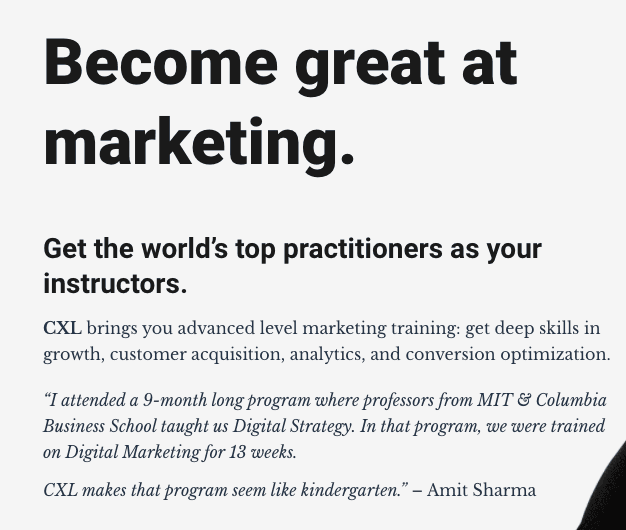
I love this example because the headline draws you in: Become great at marketing.
In four words they’ve captured why someone would want to take a CXL class. They want to get better at their craft.
Then the sub-heading follows up on that to say CXL has the top practioners in the field.
Who else would you want to learn from besides the best?
It ends with a social proof quote that says CXL is better than Harvard.
Love it.
Here are some other examples I found compelling.
2. Loom
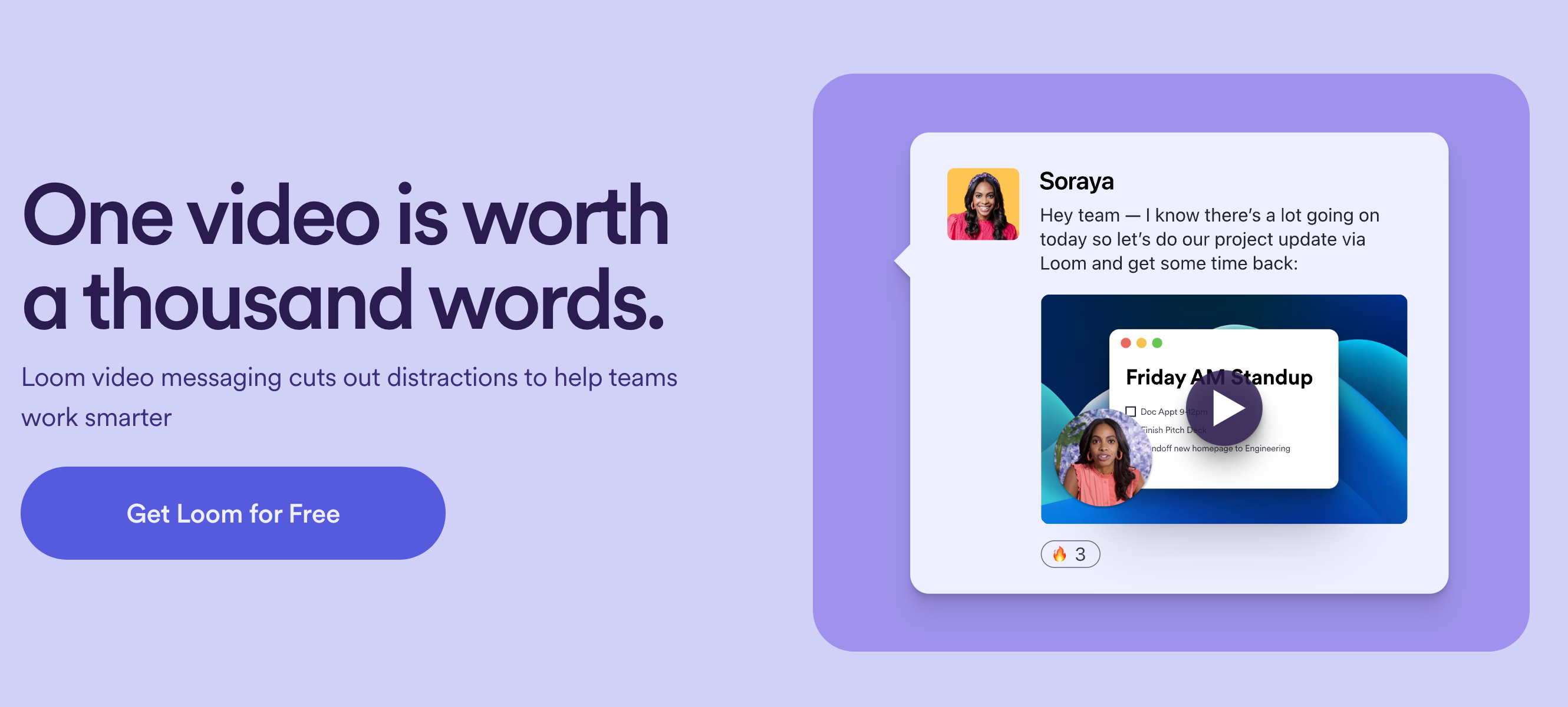
Loom is a video messaging tool.
It lets you record your screen, camera, and microphone to make a quick video.
Recording a loom is more personal (it’s literally your face and voice) than writing out a long Slack message or email.
And their headline “One video is worth a thousand words.” sums up that value perfectly.
The sub-headline hammers the point home: “Loom video messaging cuts out distractions to help teams work smarter”.
The message is clear: stop wasting time writing out things by hand and record a quick video instead.
3. Thomas Frank Sales Page
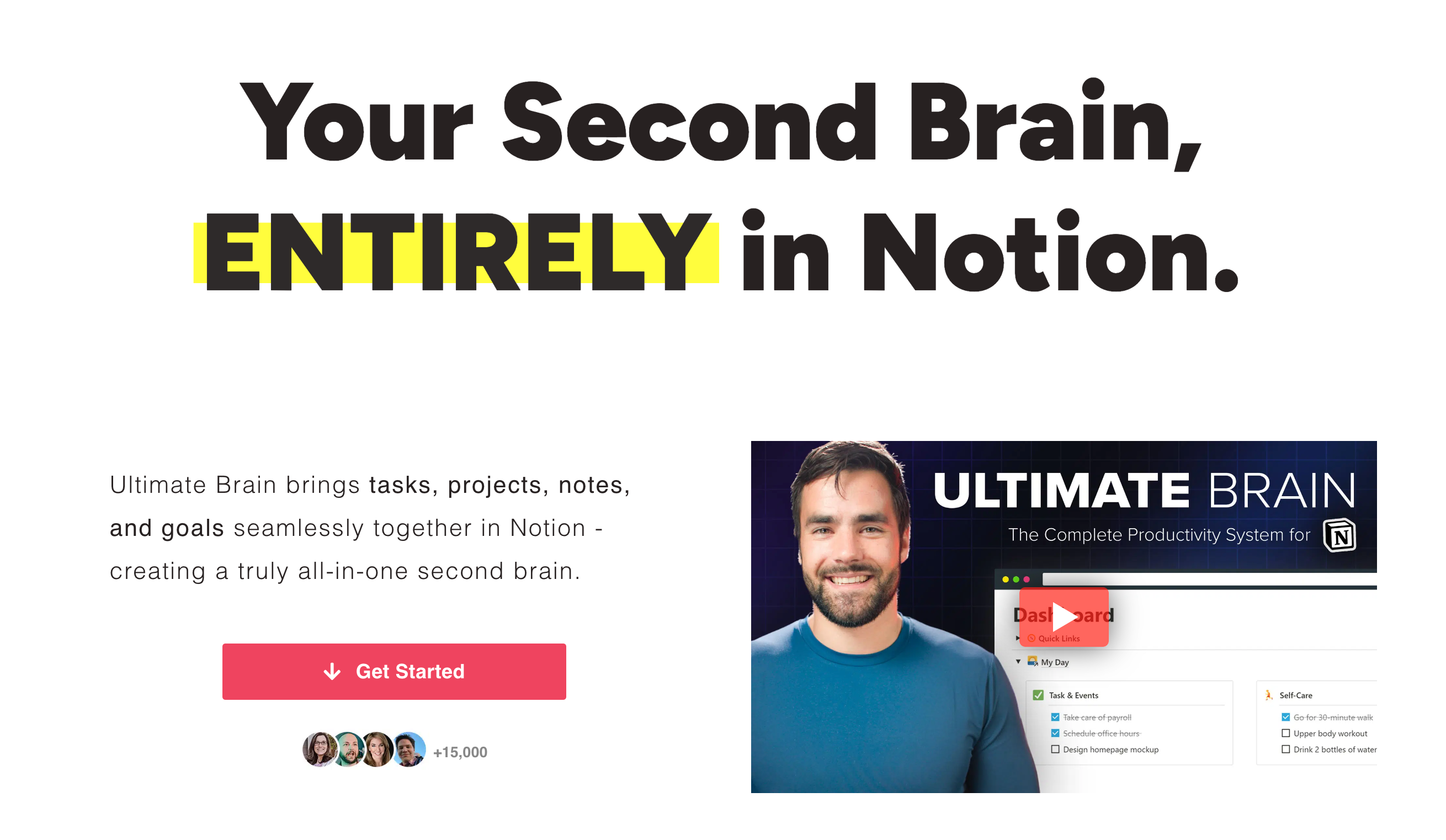
Let’s look at a sales page.
Thomas Frank is a Productivity and Notion creator with millions of Youtube views and a business that generates millions of dollars every year.
One of his products is called Ultimate Brain, which is a Notion template that creates what’s called a second brain system.
You can see other second brain Notion templates here but it’s a product that sells for almost $100.
Let’s analyze the conversion copywriting on his page with the 3 elements I described earlier.
1. Social proof

We see social proof right off the bat in two places:
- There’s a quote at the bottom of the hero section by Tiago Forte who literally invented the Second Brain system.
- There are some pictures and presumably a count of sales right under the Get Started button
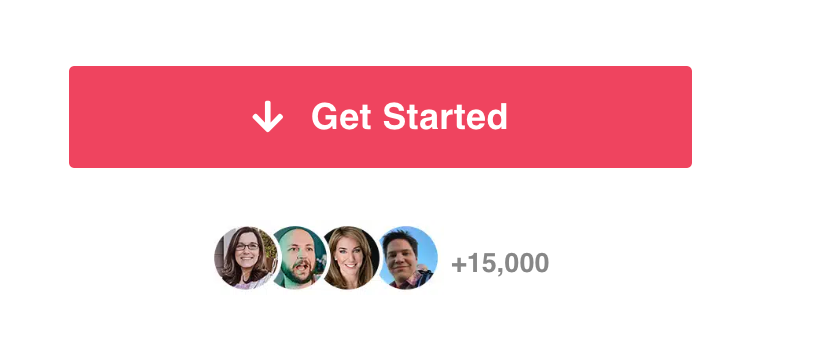
Wow! This product must be amazing for the creator of the system to give such a compelling quote.
There are 5 more block quotes throughout the rest of the sales page and then there’s a big testimonial section at the very bottom.
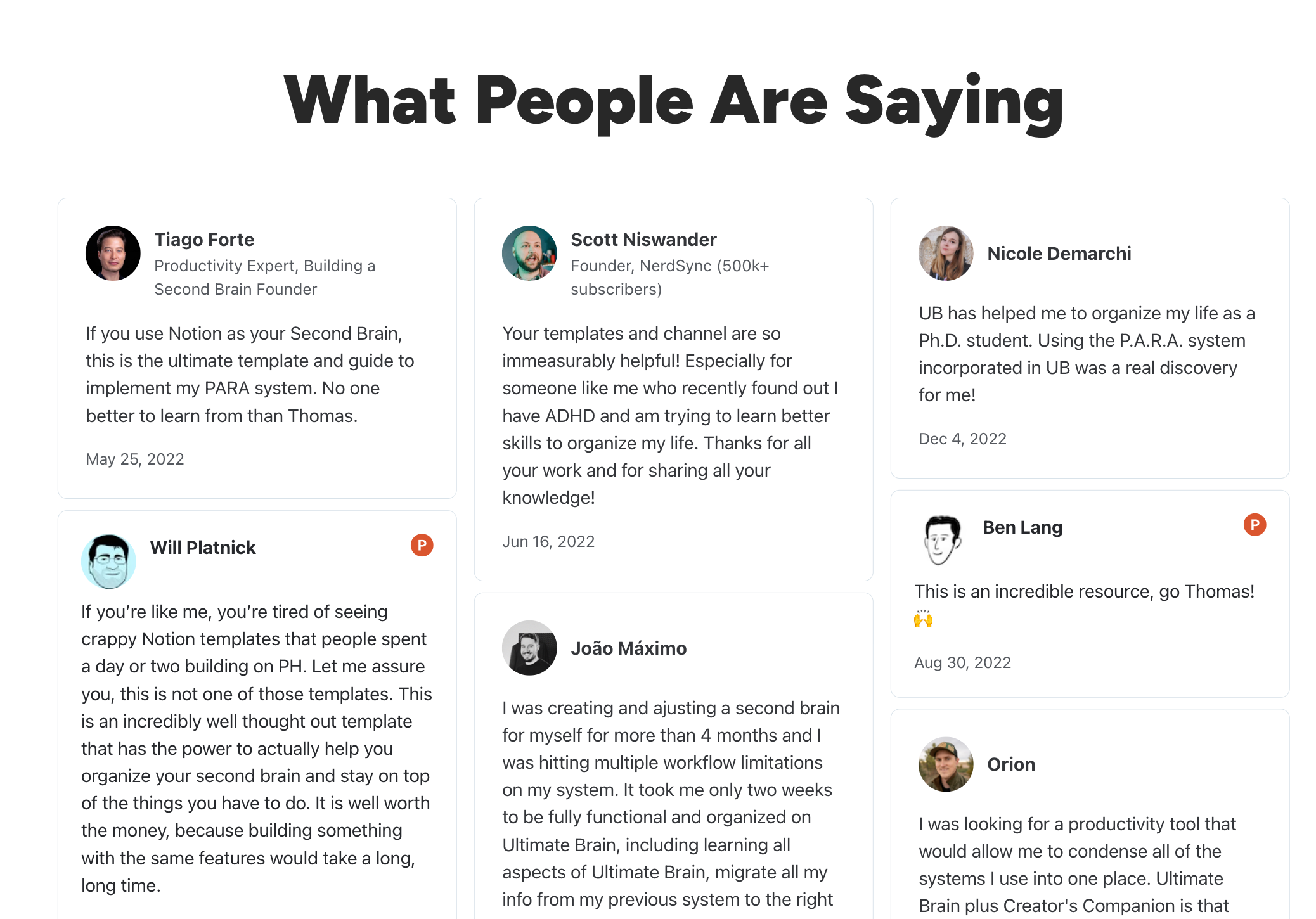
Thomas Frank nails the social proof aspect of this page.
2. Authority
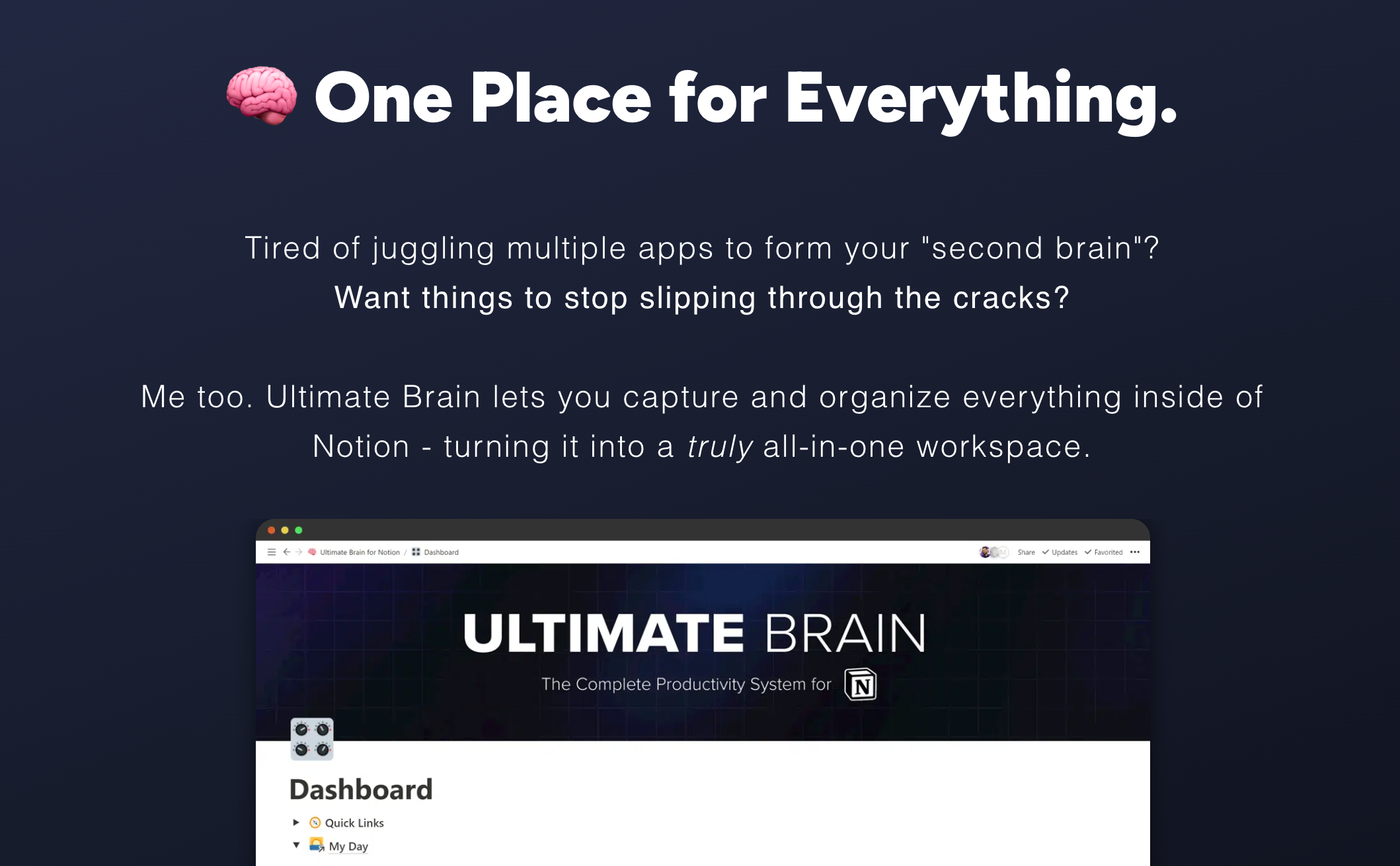
Most people who visit this page know who Thomas Frank is.
He has a sales funnel that converts people who download this free Notion templates into sales via email marketing loops.
Most people find his free Notion templates from his website or Youtube channel, so he’s already established authority there.
This quote in the second block on the page also helps establish his authority:
Tired of juggling multiple apps to form your “second brain”? Want things to stop slipping through the cracks? Me too. Ultimate Brain lets you capture and organize everything inside of Notion - turning it into a truly all-in-one workspace.
Me too.
He stated a problem and then empathized with you by saying he’s gone through the same things.
Nicely done.
3. Specificity
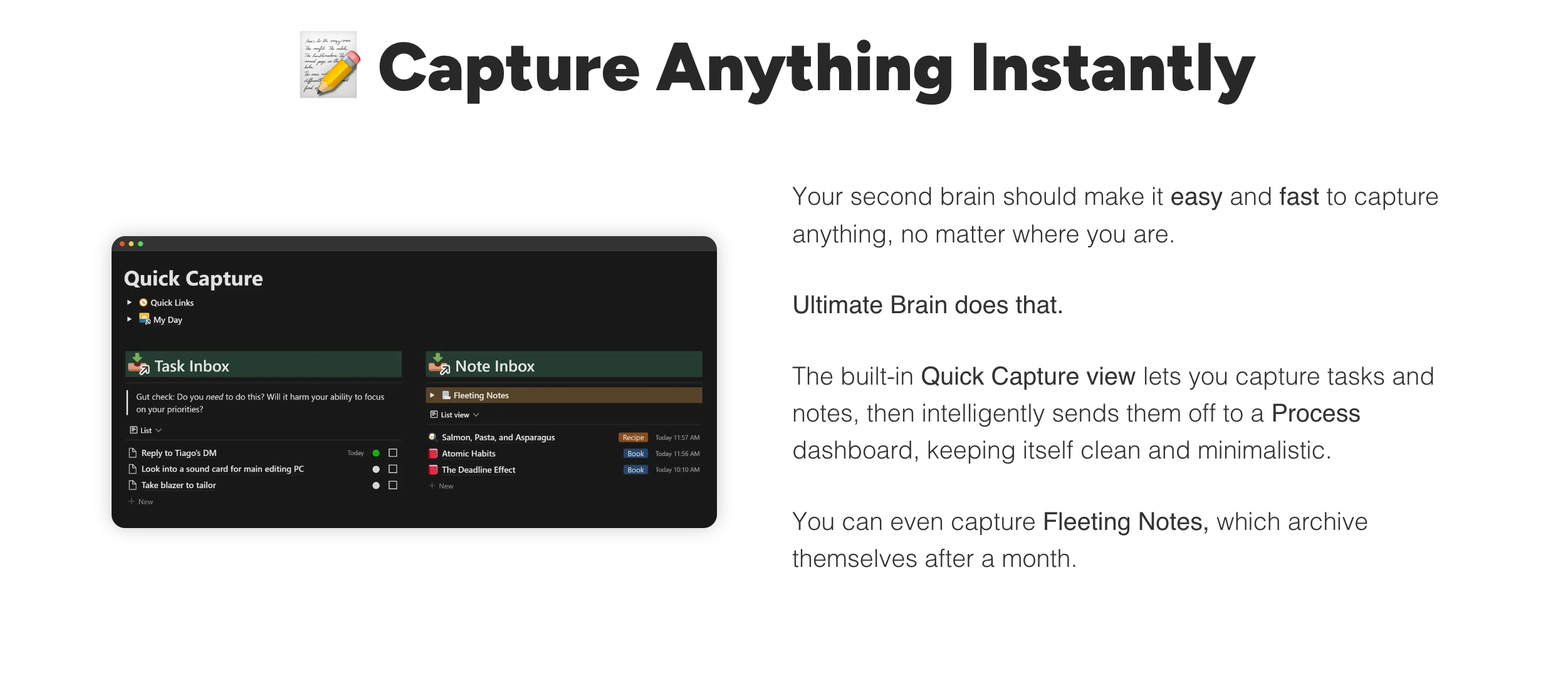
This entire page is a masterclass in specificity.
Starting from the supporting text in the hero image:
Ultimate Brain brings tasks, projects, notes, and goals seamlessly together in Notion - creating a truly all-in-one second brain.
You know exactly what you’re getting.
As you scroll down the page he goes in-depth on all the features in the template.
The sales page is really long and the deeper you scroll the more information you get.
By the time you get to the bottom you really want to buy this thing.
Here’s another link to the page so you can check it out.
Wrapping Up
Conversion copy persuades your users to take action, usually by purchasing your product or signing up for your service.
Good conversion copy smashes objections and provides all the reasons why they should take action, through social proof, authority, and specificity.
Conversion copy can also help improve your cover letters so you stand out from the crowd.
It’s the single most important skill you can develop and it’ll affect every single area of your life.
From convincing your boss of something or making a sales page to sell a digital product, conversion copywriting is used everywhere.
I covered 3 examples including a full tear-down of Thomas Frank’s Ultimate Brain product.
And if you really want to improve your skills then check out this class by CXL.
